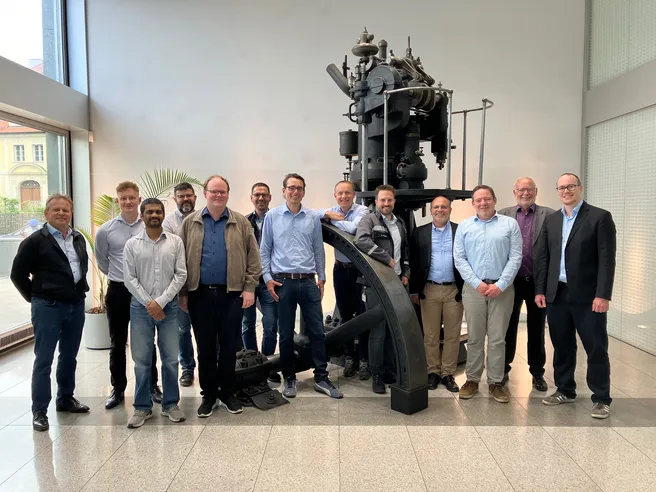On May 7, 2024, the final meeting of the AmmoniaMot project took place at MAN-ES in Augsburg in a hybrid format. The photo shows the participants present in Augsburg. The host was Christian Kunkel from MAN-ES (7th from left) and the project manager was Carsten Tietze from WTZ Roßlau (8th from left).
Ammonia is increasingly seen as a promising alternative to current carbon-based fuels in the maritime sector. Accordingly, research and development into large engines powered by ammonia is being intensively pursued. The AmmoniaMot project has been dedicated to this topic since 2020 and has delivered extensive results. The development of the first commercial ammonia two-stroke engines is meanwhile nearing completion.
The main task of the three PhD students from the Chair of Thermodynamics in the AmmoniaMot consortium was to generate the necessary fundamental understanding of the physical and chemical processes involved in the piloted diffusion combustion process through basic experiments and simulation.
The experiments were carried out under well-defined, engine-related boundary conditions in a single-stroke machine. The machine allows the variation of operating conditions, injection parameters and geometric arrangements. These variations enable broad parameter studies that show their influence on combustion. Combustion and mixture formation were analyzed via heat release rate, exhaust gas composition and optical data, including shadowgraphs, chemiluminescence, Mie scattering, natural flame luminescence and spectroscopic imaging.
In parallel to the experimental investigations, a suitable numerical CFD method was developed to calculate the combustion of direct injection of both fuels under engine conditions. This method was initially used to provide additional findings that could not be obtained experimentally and thus contribute to further knowledge in addition to the experiment. Furthermore, the transition from the single injectors in the single-stroke engine to the multi-hole injectors in the single-cylinder engine of the project partner WTZ was carried out numerically in order to support the injector development and the engine tests through prediction and problem analysis. The CFD code developed will form the basis for further engine development at MAN-ES.
Valentin Scharl, one of the three doctoral students at the Chair of Thermodynamics, has already completed his doctorate (see previous post) and is currently spending a research stay in a research group at the NTNU in Trondheim, which is also working intensively on ammonia combustion. Utkarsh Pathak and Dominik Krnac, the other two doctoral students (3rd and 5th from left in the photo), are currently writing their dissertations.
AmmoniaMot was the last third-party funded project acquired by Professor Sattelmayer for the Chair of Thermodynamics. It will be continued with AmmoniaMot 2. This project will start in June 2024 under the leadership of Prof. Agnes Jocher.
